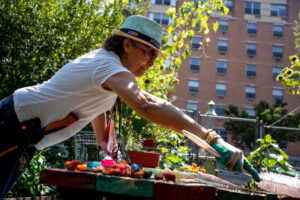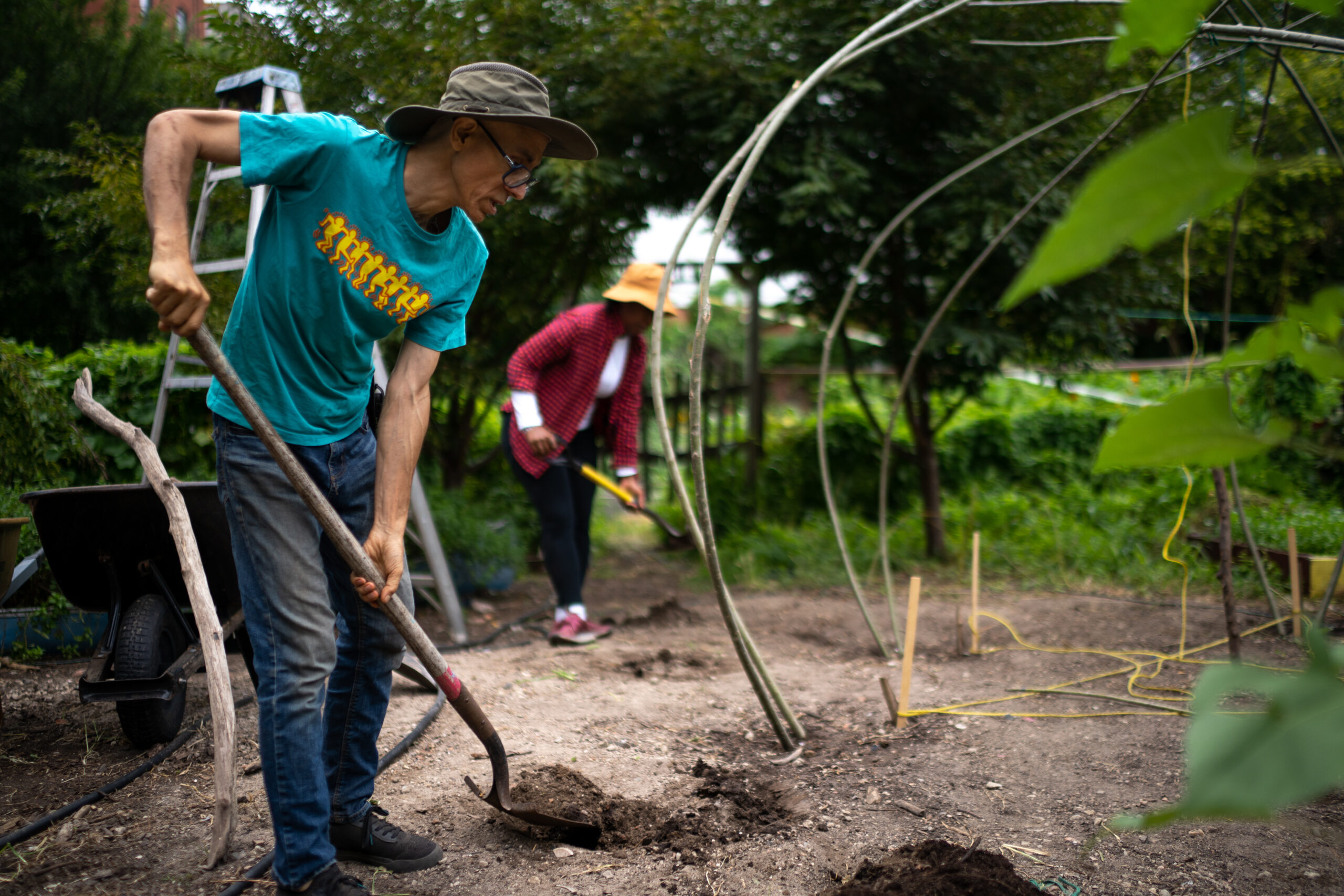The sense of social isolation brought on by the pandemic has had a silver lining in the South Bronx. An increasing number of residents have reclaimed unused lots to energize the smattering of green oases in industrial areas, taking advantage of community gardens to foster connections with their neighbors and the environment.
Three local community gardens help illustrate the value such green spaces are providing to help embattled Bronxites get through trying times.
BROOK PARK
Most days, one can find Danny Chervoni sitting across from the back entrance to one of the South Bronx’s most iconic gathering places, Brook Park, greeting passersby and chatting with neighbors.
“I’ve been here since 5 a.m.,” said Chervoni who’d been waiting since 6 a.m. for a garbage and debris pickup. Most mornings, Chervoni comes out early to attend to trash pick-ups, maintenance visits, syringe removals, phone calls with city agencies, and sometimes just to garden,
“When I’m up, I’m up,” he said, in his gruff, weathered voice. “There’s always something to do.”
Around 1,000 volunteers used to help keep up Brook Park before the pandemic, Chervoni recalls. These days, that number is closer to 30.
“This slows everything down,” he said, because volunteers “do a lot of weeding and pruning, planting, harvesting, sweeping the sidewalk, picking up hypodermic needles, building, repairing.”
The usual programming, too, has taken a hit as a result of COVID. With the closure of schools, churches, and other community institutions, Brook Park has had to reduce or cut outdoor classes, concerts, talks, and other gatherings that are a cornerstone of garden life.
“When it comes to programming, like schools and churches and organizations, where they have to deal with students and kids that are not actually theirs,” said Chervoni, COVID has caused them to “wait until they get the okay.”
Still, the park continues to host programs as it can, such as the creation of a willow dome, a small structure made from willow branches for children, with the help of a group called More Gardens.
Advocates worry that when programming stalls and volunteership dips, developers try to persuade the city to replace gardens with housing. In neighborhoods like Mott Haven where titans of real estate have recently invested major capital, anxiety over the potential loss of green spaces runs high among some community gardeners.
But Chervoni shows little sign of worry.
“You just have to deal with it. You can’t just give up and let the garden go,” he said.
RAINBOW GARDEN
About a mile north of Brook Park, a group of students walked single-file through ivy-covered fence gates outside a Melrose community garden. Once inside, they were greeted by a goateed man in his 70s in a fishing cap and a work vest.
“Welcome to Rainbow Garden,” said Maxi Rivera, enthusiastically greeting the students from nearby P.S. 29. “This is your garden!” He and other volunteers led them through rows of raised beds to look at more vegetation and a greenhouse, and to paint stones to help decorate the grounds.
Rivera, a Vietnam War veteran,and one-time candidate for State Assembly, helped found Rainbow Garden when he and other Mott Haven residents took over what had long been an abandoned lot about a decade ago. They got to work breaking up the concrete foundation to create vegetable beds, and planting peach trees, and soon began including outdoor events for South Bronxites of many nationalities.
“I call it the United Nation because we have people from South America, North America, Europe,” he said. “We got people from India, Africa, everybody is here, and we all get along.”
Throughout the pandemic, Rainbow Garden has held its own, feeding residents with garden-grown food and hosting events safely.
“There was a lot about COVID that was heavy, that was pain,” said Raihannah Jefferson, who joined earlier this year, volunteered to help out during the pandemic and learned about growing food. “But then there’s this [the garden], to see the fruits of that pain. It’s like, ‘wow, let’s keep going’.”
Jefferson hopes to take what she’s learned at Rainbow to her family-owned farm in Virginia.

Tending to the garden during the panedmic has been “surreal, amazing, beautiful, sad, all of the emotions at the same time,” says army veteran Carmen Santiago, who wants the city to step up and provide trash bins to help the gardeners clean trash passersby toss at the gate. The budget crunch, however, has slowed the city’s response to Rainbow’s needs, including letting overgrown street trees go untended. Shade cast by street tree overgrowth could endanger the plant beds, potentially depriving gardeners of the food they’re trying to grow.
But Rainbow’s do-it-yourself grit has helped it transcend city shortfalls, said Santiago.
“Inside the concrete jungle, we have a little piece of paradise.”
EL COQUI
On Melrose Avenue, El Coqui Community Garden reopened in May 2020 after a long period of abandonment. Garbage and discarded drug paraphernalia were removed to make way for raised beds and solar panels on its 1.5 acres. Coqui head gardener Bruce Rivera teams with about 20 core volunteers from Mission Helping Hand to administer pantries, deliver food to the hungry, and provide COVID testing and Narcan distribution.
Rivera says the original plan to restore the space with raised beds quickly grew to include a weekly clean-up with a youth probation program, public film screenings, an aquaponic greenhouse currently under construction, and an educational project to teach state-of-the-art agricultural technology, propelled by the isolation brought on by the pandemic.
“To be outside, to be distanced, but also to be doing something instead of cooped up at home,” he explained.
But their enthusiasm was doused when the garden was broken into twice, and $3,000 in garden tools stolen and the grounds vandalized with spray paint.
“We can’t be as trusting. We have to be careful with who we let in,” said Sofija Cas, one of Coqui’s leaders.
The city’s community garden oversight agency GreenThumb launched an investigation into the incidents that is still underway, though Kas suspects former Coqui members disgruntled with garden leaders for collaborating with the city’s parks department on some initiatives.
“There are a lot politics in the gardens,” said Kas, and added, “I try to stay out of the politics and just focus on the garden, since that’s what matters.”
Bruce Rivera suspects that in “in fostering the relationship with GreenThumb and parks department, we became kind of an outlet, kind of a connector to the community,” that can galvanize public opinion. “We all realize the importance of spaces like that to the community. But it’s a complicated situation.”

